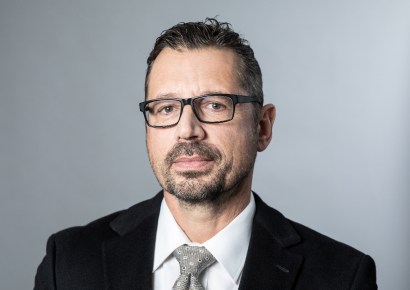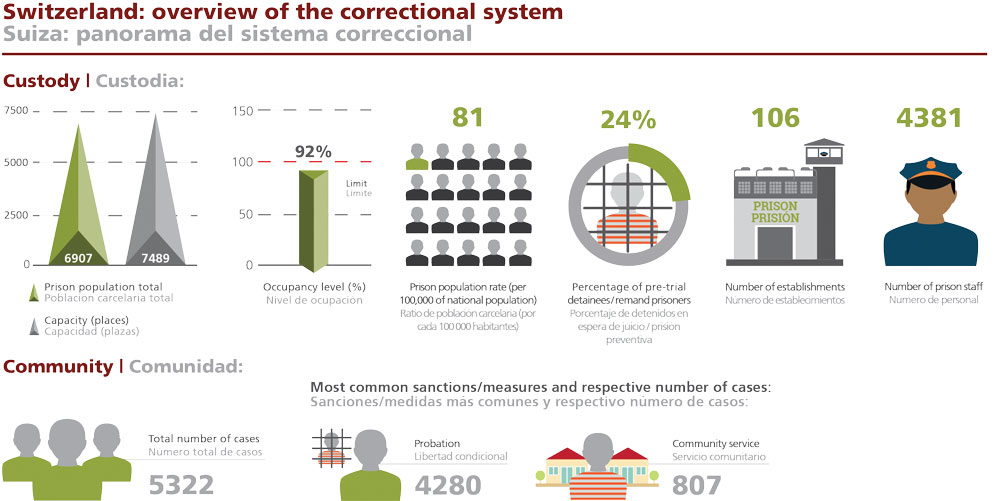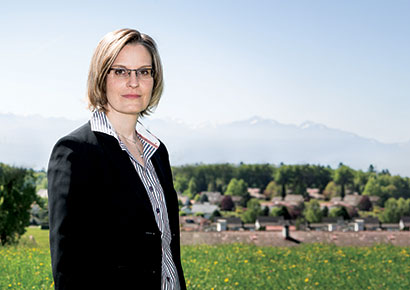// Interview: Ronald Gramigna
Head of the Execution of Sentences and Measures Unit, Federal Office of Justice, Switzerland
In the Swiss Confederation, with its State structure at the municipal, cantonal and federal levels, the cantons are largely sovereign in the organisation of their law enforcement agencies. The cantons are required to implement federal laws such as the Penal Code and the Code of Criminal Procedure, whereas the cantonal laws regarding the implementation of codes, the organisational structures and work procedures may vary strongly from one canton to the other, reflecting their histories. The Federal Office of Justice (FOJ) prepares legislative acts particularly in criminal and prosecution law, advises the federal departments and offices in all areas of law and issues legal opinions. The FOJ also manages the criminal record. At the international level, it represents Switzerland at the European Court of Human Rights and several other international organisations. In addition, the FOJ cooperates with foreign authorities in the areas of mutual legal assistance and extradition.
JT: What are the main principles framing the execution of sentences and measures in Switzerland?
RG: The principle of individualisation is one of them but there are also the principles of communication, coordination and harmonisation. I think the goal – and the challenge in Switzerland – is how we can unite those principles without slipping into an imbalance or becoming too extreme in relation to one. We now face a challenge concerning harmonisation and coordination between the cantons, and between them and the confederation.
We are guided by important ethical values which are very significant in the field of prison and probation services. It’s a very sensitive topic because we are talking about taking freedom away from people; we put them in cells and then we have the responsibility to treat them as best we can. In Switzerland, a prison sentence speaks for itself and we don’t have the idea of punishment inside our prisons. And then we have the principle of equivalence which means that the conditions in prison – especially regarding medical treatment but also other services – should be similar or equivalent to those provided in the community.
A total standardisation would probably hinder and limit the development of creativity and other values in the system and it would also limit the relationship between prisoners and staff.
JT: The 1st Swiss Forum on Prisons and Probation was held in November 2018. The event unfolded around the question ‘Standards: What Purpose?’. Moreover, its programme stated that standards exist to ensure and improve quality, especially regarding planning, action and process control while at the same time, in the execution of criminal sanctions, they also serve as a guideline ensuring that people under custody or serving community sanctions receive the same treatment. Often, however, standards tend to be formulated in abstract terms or are not sufficiently oriented to practice. In Switzerland, while standards already exist in many areas of the execution of criminal sanctions, in other areas they must be developed or strengthened. Hence, the Forum has urged reflection on this topic.
In your opinion, what is standardisation in the field of the execution of penal sanctions and what benefits and challenges does it entail?
RG: Standardisation is what gives a kind of framework in which we can develop and define the core values about the treatment of prisoners and the training of prison staff more concretely. Standardisation also provides a framework for defining the characteristics that prison staff should have, including their academic level and their training.
Because of our federal system, we have a certain limitation as regards the extent of standardisation we can achieve because we can’t prescribe the cantons strict ways of acting. Furthermore, a total standardisation would probably hinder and limit the development of creativity and other values in the system; it would also limit the relationship between prisoners and staff which arises from the specificities and differences of the country’s correctional institutions. When you have small institutions with a good environment then you have the possibility to build up creative projects with the inmates and find tailor-made solutions.
Another challenge concerns the extent of the collaboration between the cantons, given their budgetary autonomy. As for the benefits of standardisation, the major one is the possibility to make comparisons between institutions, their values, and push for their quality improvement. Now, all the cantons are working on implementing standards in the field of preventive pretrial detention, following a recommendation of the national committee for the prevention of torture. There are certain areas where it’s definitely not recommended that the differences between cantons or institutions are too big.
JT: Given the sovereignty of cantons in the field of criminal justice, prison and probation services, what is the role of the Federal State? And, what is the mission of the Execution of Sentences and Measures Unit?
RG: If we consider Switzerland’s history, the Confederation was created after the cantons, so, most of the institutions and matters are organised at the cantonal level.
At the Federal level, we are a partner that helps the Cantons to build upon and fulfil their mission, including with financial attributions. Hence, in prison and probation matters, it is my Unit’s task to help the cantons develop and improve their correctional systems and build up some quality markers. We hold a supervision function, not properly invested with political power.
I know the system very well, in fact, I used to be a prison governor myself. I have frontline and operational experience and that’s one of the reasons why I believe we have a high acceptance. I think we are appreciated by the cantons and we have some natural authority as a collaborative agency. We are an institution of experts that is open and whose perspective of the correctional system is broad. As a federal agency, we are able to look at things from another perspective and help the cantons deal with any crises. Responsibility is spread over more shoulders which makes our system very stable.
Our mission is both on an operational and strategic level. Besides, I represent the Confederation at the foundation board of the Swiss Centre of Expertise in Prison and Probation to which our office contributes financially as the Cantons do.
JT: What challenges are the Swiss corrections facing?
RG: The main challenge is surely overcrowding, which occurs mainly in the French-speaking part. This also leads us to the issue of collaboration and transfer between the cantons.
The second challenge is the mentally ill people and their treatment in the prison system, namely those with more severe pathologies who require strong medical intervention and there we have a limitation because we don’t have enough places. We are very creative, so I think we’re doing well but in the short-term, it’s really going to be an issue.
I know that for many countries the recruitment of prison staff is quite a challenge, but fortunately, that isn’t an issue in Switzerland because we pay our professionals quite well. That is one of the core values, we believe we need the best people there.
//
Ronald Gramigna graduated in Clinical Psychology, Psychopathology and Neuropsychology at the University of Zurich. He worked for several years as a clinical psychologist responsible for the treatment of drug-addict and mentally ill patients. He developed his thesis on methadone programmes and got his PhD in 1996. Later, he worked as a forensic psychologist, treating dangerous offenders. He became director of a prison in 2007. Until 2015 he was also a member of a board for the risk assessment of dangerous offenders. He is Head of the Execution of Sentences and Measures Unit at the Swiss Federal Office of Justice since 2015.
Interview: Fredy Fässler
Chair of the Board of the Swiss Centre of Expertise in Prison and Probation and Head of the Security and Justice Department of Canton Saint-Gallen, Switzerland
The Swiss Centre of Expertise in Prison and Probation (throughout the text, it is often abbreviated to “the Centre”) has existed since January 2018, but its history goes back to the late ’70s. In 1977, the Swiss Confederation, the Conference of Cantonal Justice and Police Directors (KKJPD) and the three regional concordats on the execution of criminal sanctions created the Swiss Prison Staff Training Centre, whose purpose was providing professional training and continuing practical and theoretical education for professionals working in the execution of sentences and measures.
The KKJPD decided to establish the Centre to promote the harmonisation of essential aspects of the execution of criminal sanctions in Switzerland. At the same time, it gave it the objective of developing standards and recommendations on the mandate of the KKJPD and encouraging the exchange of information and good practices between cantons and concordats.
Alongside well-established institutions and offerings such as the training centre, education for inmates (FEP) – as of 2020 –, Health in Prison Switzerland (SPS) and capacity monitoring, service areas such as crime and risk management and security now work together as a think tank under one roof.
JT: What triggered the decision to create the Swiss Centre of Expertise in Prison and Probation?
FF: The demands and expectations placed on the prison system have increased considerably in recent years. The complexity of tasks and the pace of change have also increased. On the one hand, this has led to the realisation that the professional groups working in the correctional system need to work together more closely still. On the other hand, it has become apparent that various tasks within the cantonal and concordat borders can no longer be performed entirely satisfactorily. It is for this reason that a nationwide centre of expertise for the penal system was called for.
JT: What do you consider to be the main challenges to achieving the Centre’s objectives?
FF: The Centre has only been operational since August 2018. It is therefore too early to take stock. Bringing together the different mentalities in the different language regions of Switzerland will certainly be no easy task. In some cases, different practices have developed over the years. Nevertheless, all the cantons have committed to common principles as to how the penal system in Switzerland should be configured in a policy paper. This is a sound starting point.
JT: Recently, the Centre co-organised the 1st Swiss Forum on Prisons and Probation. The event’s main topic was standardisation in the execution of sanctions in Switzerland.
How can the Centre contribute to the setting of standards?
FF: Standards serve to simplify the complex work done in the correctional system through clear guidelines and procedures. They instil trust and provide transparency. However, standards should only be set where harmonisation is truly necessary and adds value. Cross-cantonal standards must be issued by the respective policymakers [i.e. the Swiss Conference of Cantonal Justice and Police Directors (KKJPD), intergovernmental conferences of the concordats]. If standards on a specific topic are deemed necessary, the Centre of Expertise is mandated to work together with practitioners from the various specialist fields within the correctional system and language regions, and consult with academics, to develop basic principles and make tangible proposals. The Centre supports the cantons and concordats in developing standards, albeit without any decision-making powers.
All the cantons have committed to common principles as to how the penal system in Switzerland should be configured. This is a sound starting point.
JT: What has been the work of the Swiss Centre of Expertise in Prison and Probation in relation to pressing matters such as violent extremism, health, and capacity monitoring?
FF: The Centre brings together various tasks that have been harmonised in independent structures throughout Switzerland. These include healthcare-related tasks as well as the collection and evaluation of data for the planning of the required amount and types of detention places. The Centre has taken on these tasks with the remit of better aligning them with the needs of those responsible for law enforcement in the cantons and exploiting synergies with the other areas of responsibility. In the case of violent extremism, the Centre has drawn up a policy paper of various recommendations in collaboration with practitioners from the cantons. These have been approved by the KKJPD. Some of the recommendations, in turn, concern the Centre itself: it is required to draw up a report on screening and risk assessment instruments for the prison system which can be used to identify radicalisation tendencies. It is to produce a handbook on measures for the promotion of dynamic security as well as a catalogue of measures featuring an overview of proven interventions in dealing with radicalised offenders. Finally, the provision of further training opportunities for prison staff, including pastoral workers in prison institutions, has been identified as an area of future activity.
JT: In the digital age we are living in, to what extent does the Swiss Centre of Expertise in Prison and Probation promote and use technologies to carry out its mission?
FF: The Centre uses new technologies, for example in the field of education. New methods are being sought for the collection, evaluation and up-to-date processing of the data required for capacity monitoring. Here, new technologies offer new possibilities for the generation of current overviews and simulation of potential developments. Finally, the Centre is also certain to be dealing with questions relating to the electronic prisoner and medical records. New technologies also play an important role in ensuring institution security. This field is to be newly established by the Centre. It seems important to me that specialists can exchange ideas and learn from one another across cantonal borders here.
JT: As Minister of Security and Justice of the Canton Saint-Gallen, one out of 26 cantons, what are the main developments you’ve witnessed during your time in office?
FF: In addition to various construction projects aimed at improving and modernising the prison infrastructure, the introduction of the “risk-oriented sanctions enforcement (ROS)” working model certainly stands out. According to the Swiss understanding, the main objective of work in prisons is to prevent new crimes, thus avoiding further victims and protecting society. This is to be achieved by promoting the social, educational and professional skills of convicted persons by having them confront their crimes, providing optimum risk management and, in most cases, facilitating sustainable reintegration. ROS provides for structured enforcement of sanctions in four steps. To put it simply, the first step is to identify those cases in which an in-depth clarification is necessary because there are indications of increased risk. In the second step, a case concept is developed that identifies risk-relevant problem areas. In the third step, preventive interventions are carried out based on this concept, and the procedure as to how to react to certain warning signals is recorded (risk monitoring). In the fourth step, the course of the individual’s time in detention and the results of the work carried out there are reviewed and evaluated by means of regular status reports and standardised enforcement reports. With ROS, the risk of reoffending and the offender’s need for intervention are better recorded and dealt with in a more targeted manner using multi-level, instrument-aided work processes. Skills that can be used to compensate for existing deficits are promoted. The results of the enforcement work are systematically evaluated. ROS supports enforcement planning and promotes interdisciplinary cooperation.
//
Fredy Fässler is the Head of the Security and Justice Department of the Canton Saint Gallen since 2012 and is Chair of the Board of the Swiss Centre of Expertise in Prison and Probation since 2018. He is a Lawyer and a mediator and has been a Member of the Grand Council from 1992 to 2012.
Interview: Sylvie Bula
Director of the Canton Vaud’s Prison Service and President of the
Conference of Heads of Cantonal Prison Services, Switzerland
JT: Can you please give us an overview of the Vaud’s correctional system?
SB: The Penitentiary Service (SPEN), under the authority of the Grand Conseil (cantonal legislature) and the Conseil d’Etat (State Council), ensures the welfare of those subject to criminal law, whether prior to a court case if a prisoner is to be detained, or following the judgement if a prison sentence is handed down, until their final liberation. At each of these steps, the SPEN is the guarantor of the double mission set out in the Penal Code: the protection of the community and the re-socialisation of those condemned by developing their aptitude to live without committing further crimes.
Today, the Canton of Vaud has five penitentiaries for adult detention and an institution for minors and young adults. In total, this represents an official holding capacity of 795 places (for almost 1000 prisoners, due to overpopulation in the Canton’s prisons). The Canton of Vaud, as the third canton of Switzerland at a penitentiary level, has the particular feature of offering places for all kinds of detention: for women, men and minors.
At the beginning of 2016, the Penitentiary Service of Vaud presented its Report on Penitentiary Policies to the State Council. The latter presented it to the Parliament who accepted it in December of the same year. The Penitentiary Service has thereby provided itself with a strategic piloting tool that is both innovative and a precursor in French-speaking Switzerland.
The Report on Penitentiary Policies highlighted the main challenges that we will be confronting over the next 10 to 15 years, as well as the strategic priorities we are pursuing in response to them. In this case, we are going to focus mainly on developing our human resource management in the context of our service’s important growth. The other absolute priority concerns the development and modernisation of our infrastructures. The implementation of modern security concepts and the development of danger level evaluation and risk management are also part of our priorities.
These objectives are part of the continuation of the efforts made since 2012 which have entailed the creation or transformation of 250 prison places, while significantly increasing staff resources.
JT: Regarding the goals that you are pursuing, what are the main challenges and opportunities in your canton and to what extent do they differ from those of other cantons?
SB: Our major challenge is twofold. On the one hand, we must have enough prison places to meet the needs of the penal system and on the other hand, we must have the right amount of staff with the necessary qualifications and training to guarantee adequate and secure care. We are, therefore, exploring the possibility of building a new prison which will be able to provide 410 detention places. This need is more acute in the French-speaking cantons of Switzerland than in the German-speaking cantons who do not encounter the same problems of prison overpopulation.
In addition, our concerns lie with the old technology and methodology relating to risk assessment of all types and dangerousness. We must also modernise our care procedures to favour reinsertion, either in Switzerland or in the country of origin, for a penal population that has significantly evolved over the past fifteen years. Finally, we are also looking at the care to be provided for prisoners with psychological problems, a group that is unfortunately growing.
JT: We are aware that up to now it had not been possible to agree on a single technical electronic monitoring solution for the whole of Switzerland. (Source: 24Heures.ch, “Le choixardu des bracelets électroniques”, 30.03.2017). Why is that so? Could you describe the obstacles in this process and what is the state of play regarding the use of electronic bracelets at present?
SB: The Canton of Vaud has been a pilot canton in the use of electronic monitoring since 1999. It has always been in favour of a Latin solution, followed by a national solution. In this sense, it agrees with the transitional solution, proposed by the Canton of Zurich, until a national solution can be put in place in 2023. There are multiple difficulties surrounding this project. These relate as much to their technological shortcomings that limit the uses for the bracelets, as to the cantonal realities that have very different needs. The Canton of Vaud is currently using around forty bracelets, mainly for the execution of short sentences. The Canton of Vaud remains very attentive to the technological developments offered by the various suppliers of electronic monitoring.
JT: The last question can be said to relate to the degree of standardisation in the execution of criminal sanctions throughout Switzerland…
What is your perspective on the establishment of standards as to how the cantons carry out the execution of criminal sentences?
SB: We must explore the possibilities of harmonisation between the cantons, based on existing best practices. Complete standardisation would encounter conflicts between divergent cantonal realities (size, prison population, different legal bases, means, etc.) which sometimes justify a differentiated approach. On the other hand, we must instigate a permanent dialogue and an efficient distribution of information, so that we may capitalise on each other’s experiences and further exploit the synergies, particularly in avoiding the development of similar projects.
The key issue in years to come will be continuing the development of synergies on a national level, over and above linguistic or concordat borders (...)
JT: You are the President of the Conference of Heads of Cantonal Penitentiary Services. Based on this experience and regarding the future, what would you say are the main issues of concern regarding the country’s correctional services?
SB: The key issue in years to come will be continuing the development of synergies on a national level, over and above linguistic or concordat borders, considering the particularities of each canton and the riches of the federalist system. In a context where means are limited and unequal, we must be able to favour sharing our strengths to continue to develop our services and adapt our care to the evolution of the population placed under our responsibility.
//
Sylvie Bula is the Head of the Penitentiary Service (SPEN) of the Canton Vaud, Switzerland, since November 2011. She had been strongly involved in the SPEN Management Committee since 2005. She holds a Master from the HEC School of Management and has previously worked in various audit firms.






